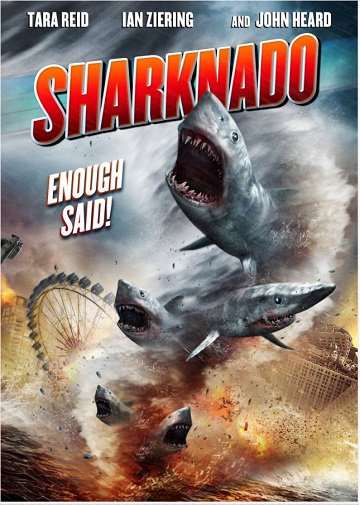"Sharknado" Debunked: Ridiculous Plotpoints Exposed
 The popular TV-movie “Sharknado” has whipped social media into a shark-infested frenzy.
The popular TV-movie “Sharknado” has whipped social media into a shark-infested frenzy.The SyFy Channel’s latest campy disaster movie premiered last night to stellar ratings and an even greater response from social media. It stars actors such as Tara Reid (“American Pie”) and Ian Ziering (“Beverly Hills 90210”) and details many weather events in an absurd and fantastical fashion. Although the movie is meant as satire, we’d like to take the opportunity to debunk some of the more ridiculous aspects.
Clear from the title, the made-for-TV movie details a horrific storm fueled by global warming sweeps over the ocean bordering California then barrels down on the state, with massive and angry sharks in tow. The residents are then forced to utilize a number of weapons (bombs, chainsaws, guns) to kill the sharks. According to AccuWeather.com meteorologists, the film doesn’t hold water in several areas.
Sharknado Myth #1: Sharks are swept up in a tornado and pose threats to the characters on land.
A tornado would not have the ability to sweep up marine life. Traditionally, a tornado is formed over land where a similar formation over water would be known as a waterspout. Understandably, “Shark-Spout” doesn’t have quite the same ring to it.
Greg Skomal, a Shark Specialist at the Massachusetts Marine Fisheries, also shoots down the “Sharknado” plot by explaining that: “The concept that sharks cannot only survive being swept up in a tornado but also attack humans is absurd.”
Sharknado Myth #2: An extremely strong hurricane hits Southern California.
The likelihood of a storm like the one in “Sharknado” affecting Los Angeles is very unlikely. AccuWeather.com Meteorologist Kristina Baker explains that, “Hurricanes are extremely rare in South California because of the cool water off the shore.”
Past history suggests that California is relatively safe from these storms. The only recorded tropical storms in the area were an unnamed storm in 1939 and hurricane-force winds in San Diego which were determined to have occurred by NOAA in 1858.
Sharknado Myth #3: Global warming directly caused this extraordinary weather event to occur.
The movie directly links the events occurring in the film with climate change and the rising temperatures. While climate change cannot be conclusively proven to have “caused” certain weather events, climate change would have to continue exponentially for hundreds of years to create the conditions described in the film.
The movie’s fantastical aspects prompted many reactions on Twitter. The Red Cross of Oklahoma even joined in, commenting that “We survived the #Sharknado! Be prepared for real situations, though. Download #RedCross Tornado & First Aid apps.”
Baker reiterates that with any tornado or hurricane, even if sharks are not raining down upon citizens, it is important to “seek shelter in a sturdy building, in the most interior room.” Debris swept up by these storms, as the sharks were in the film, presents risks of injury and death.
Although the science doesn’t hold up, we can only hope a potential sequel, “Sharknami,” is already in the production planning stages.
You can return to the main Market News page, or press the Back button on your browser.

